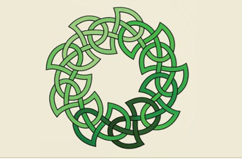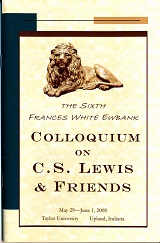Event Title
Session 5-A: Moral and Spiritual Development int he Work of C.S. Lewis
Location
Taylor University, Metcalf 101
Start Date
31-5-2008 3:30 PM
Description
"Flight Instructor for the Soul: C.S. Lewis's Vision of Human Freedom through an Imaginative Obedience" - Corey J. Kinna
“Mortality is a mountain which we cannot climb by our own efforts; and if we could we should only perish in the ice and unbreathable air of the summit, lacking those wings with which the rest of the journey has to be accomplished. For it is from there that the real ascent begins. The ropes and axes are ‘done away’ and the rest is a matter of flying” (Man or Rabbit? – God in the Dock). Within the Lewisian canon there is the idea that there is another type of obedience, an imaginative obedience to God best expressed as the freedom of flight. All who want it eventually grow the necessary wings, some sooner than later. Lewis’ imaginative obedience brings encouragement to all who are willing to listen.
"The Theme of Desire in the Writings of C.S. Lewis: Implications for Spiritual Formation" - Connie Hintz
If we remain faithful to the path of desire, steadfastly refusing all that fails to satisfy, and holding fast to our deepest longing, we can trust it to lead us to life in all its fullness. Drawing on his own experience of following the path of desire to its ultimate destination in God, C.S. Lewis is a worthy guide to the role of joy in spiritual formation. He points out the many detours and hazards that could cause us to lose our way. Acknowledging that life holds much disappointment and tragedy, Lewis suggests that even our pain may become an effective tool for prying us free from our idolatrous affections and nudging us closer to real joy. Lewis views all our earthly joys as signposts pointing us to God, the Source of all joy.
"That Hideous Woman: Lewis and the Amazon Myth" - Joe Ricke
C.S. Lewis has been strongly criticized for his misogynistic representations of women, nowhere more blatantly, so it is claimed, than in That Hideous Strength. Much of this sort of criticism assumes that Lewis is writing a purely didactic work, based primarily or even completely on his own assumptions about life which he embodies in works of fiction. Instead, this essay considers Lewis as a writer within a tradition. In this case, the tradition of medieval and renaissance appropriations and revisions of classical versions of femininity, especially the legend of those man-hating wild women, the Amazons. In his own scholarly work, especially on Spenser, and in other medieval and renaissance sources, Lewis encountered numerous examples of strong, warrior women, with a variety of inflections depending upon the texts and the cultures from which they arose. In That Hideous Strength, and to a lesser degree in other works, Lewis depicts warrior women with a similar variety of meanings and for a variety of purposes. Specifically, Jane Studdock and Fairy Hardcastle in That Hideous Strength, should be viewed within this tradition if readers are to understand them as more than products of an over-active sexist imagination.
Moderator: Larry Fink
Event Type
Paper
Link to Papers
The Theme of Desire in the Writings of C.S. Lewis: Implications for Spiritual Formation
That Hideous Woman: Lewis and the Amazon Myth (Not available)
Session 5-A: Moral and Spiritual Development int he Work of C.S. Lewis
Taylor University, Metcalf 101
"Flight Instructor for the Soul: C.S. Lewis's Vision of Human Freedom through an Imaginative Obedience" - Corey J. Kinna
“Mortality is a mountain which we cannot climb by our own efforts; and if we could we should only perish in the ice and unbreathable air of the summit, lacking those wings with which the rest of the journey has to be accomplished. For it is from there that the real ascent begins. The ropes and axes are ‘done away’ and the rest is a matter of flying” (Man or Rabbit? – God in the Dock). Within the Lewisian canon there is the idea that there is another type of obedience, an imaginative obedience to God best expressed as the freedom of flight. All who want it eventually grow the necessary wings, some sooner than later. Lewis’ imaginative obedience brings encouragement to all who are willing to listen.
"The Theme of Desire in the Writings of C.S. Lewis: Implications for Spiritual Formation" - Connie Hintz
If we remain faithful to the path of desire, steadfastly refusing all that fails to satisfy, and holding fast to our deepest longing, we can trust it to lead us to life in all its fullness. Drawing on his own experience of following the path of desire to its ultimate destination in God, C.S. Lewis is a worthy guide to the role of joy in spiritual formation. He points out the many detours and hazards that could cause us to lose our way. Acknowledging that life holds much disappointment and tragedy, Lewis suggests that even our pain may become an effective tool for prying us free from our idolatrous affections and nudging us closer to real joy. Lewis views all our earthly joys as signposts pointing us to God, the Source of all joy.
"That Hideous Woman: Lewis and the Amazon Myth" - Joe Ricke
C.S. Lewis has been strongly criticized for his misogynistic representations of women, nowhere more blatantly, so it is claimed, than in That Hideous Strength. Much of this sort of criticism assumes that Lewis is writing a purely didactic work, based primarily or even completely on his own assumptions about life which he embodies in works of fiction. Instead, this essay considers Lewis as a writer within a tradition. In this case, the tradition of medieval and renaissance appropriations and revisions of classical versions of femininity, especially the legend of those man-hating wild women, the Amazons. In his own scholarly work, especially on Spenser, and in other medieval and renaissance sources, Lewis encountered numerous examples of strong, warrior women, with a variety of inflections depending upon the texts and the cultures from which they arose. In That Hideous Strength, and to a lesser degree in other works, Lewis depicts warrior women with a similar variety of meanings and for a variety of purposes. Specifically, Jane Studdock and Fairy Hardcastle in That Hideous Strength, should be viewed within this tradition if readers are to understand them as more than products of an over-active sexist imagination.
Moderator: Larry Fink


